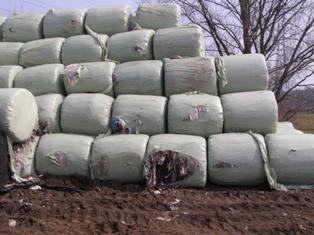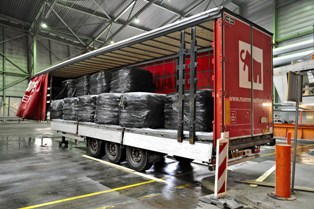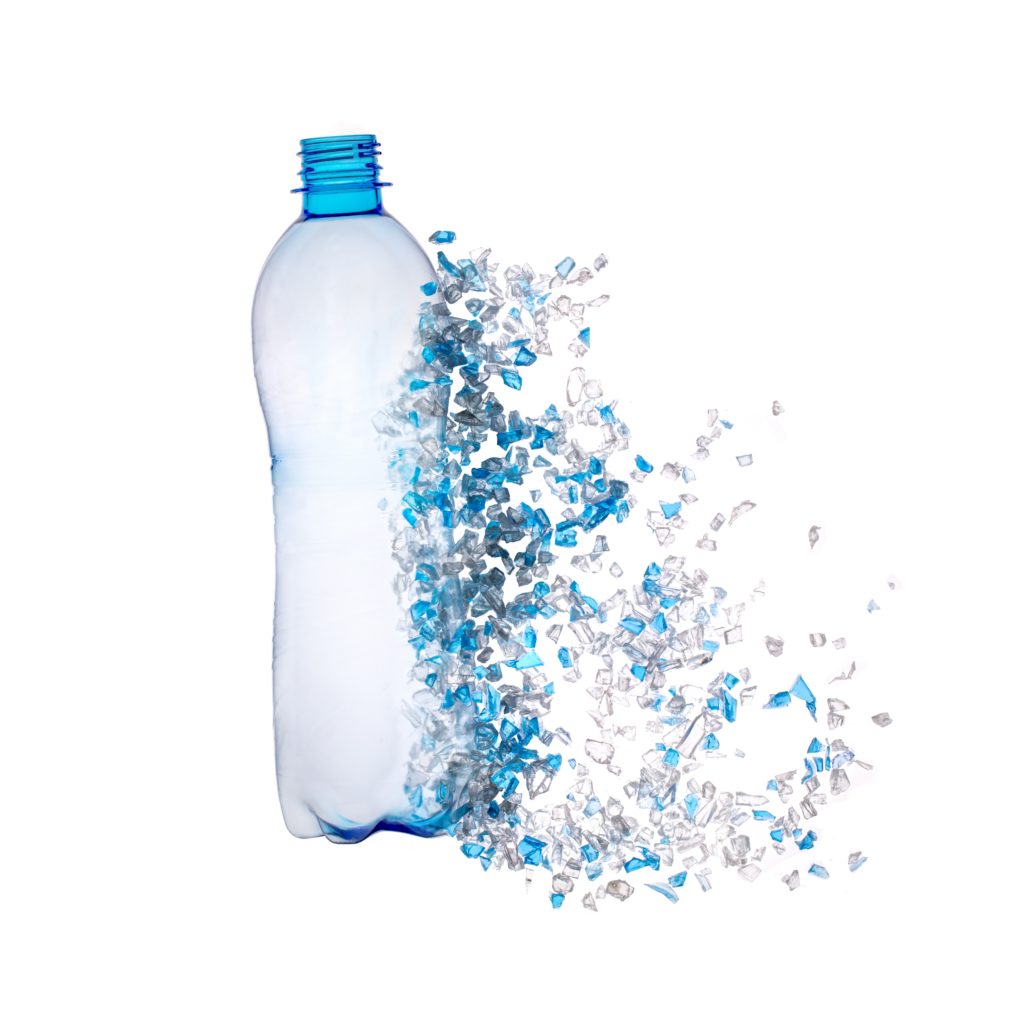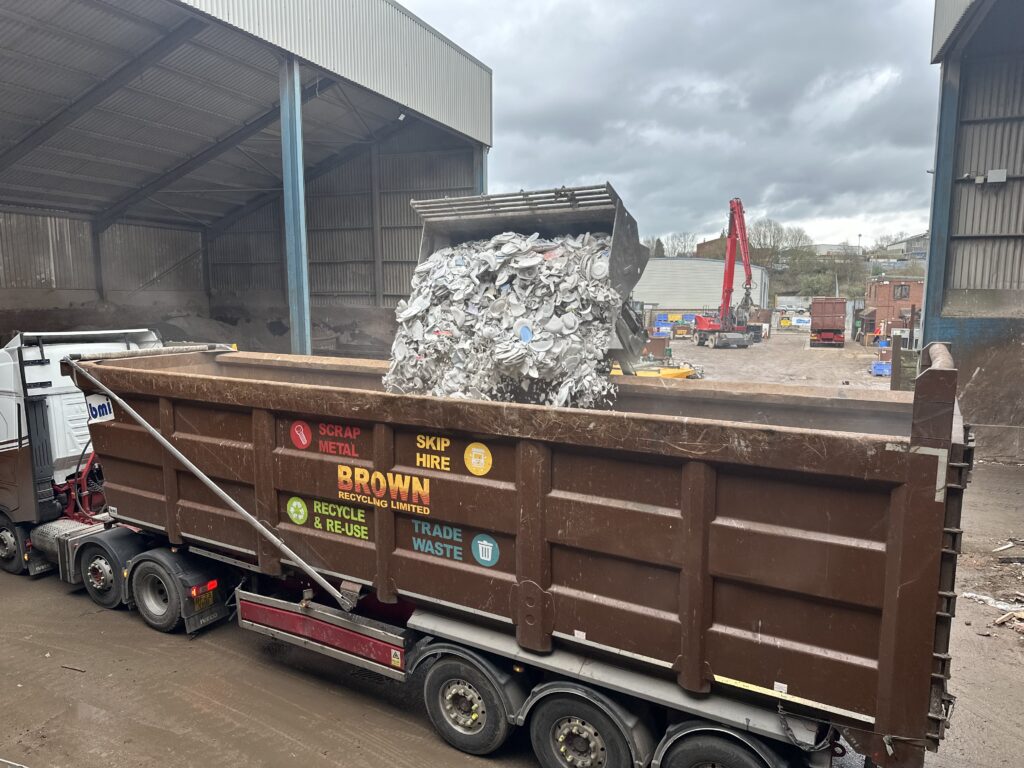Some in the waste management sector consider that while there is a legitimate trade in the material to northern Europe for energy recovery, there are increasing issues about potentially improper actions regarding RDF.

RDF has become increasingly popular within the waste management industry over the past two years. It means municipal and commercial waste can be baled and wrapped and then exported rather than having to landfill it in the UK. There is a shortage of facilities to burn it for energy recovery within the home market.
Even local authorities, such as the West London Waste Authority, have issued large contracts for the export of the material to reduce their reliance on landfill.
Essex
But, cases are now emerging regularly of problems with RDF. At the weekend (April 13) the BBC (see: Household waste disguised as hay bales dumped in Essex) highlighted baled waste which appeared to be RDF stored on a field in Purfleet, Essex, with the report suggesting that the bales looked like agricultural material. An Environment Agency investigation is underway.
And, commenting on an ongoing case in the West Midlands, the Environment Agency has told letsrecycle.com that it is to return to the High Court (see: EA Brierley Hill) over waste material believed to be destined for export as refuse derived fuel which has been piled up at a Refuse Derived Fuel Ltd’s waste site in Brierley Hill.
The new action comes after the company which stored the fuel, Refuse Derived Fuel Ltd of Dudley, failed to comply with earlier court actions before a deadline of March 29 2013.
The companys stocks of the RDF material tower above the landscape and there has been a series of measures and actions by the Agency in an attempt to enforce waste regulations at the site.
In December 2012 the Court granted the Agency a mandatory injunction requiring Refused Derived Fuel Ltd to completely remove all waste on site by 1 July 2013. The section of the site visible from the main gate must be cleared by March 2013.
But, on a visit to the site earlier this month, the Agency found that the section near the main gate had not been cleared.
Bales
A spokeswoman told letsrecycle.com: “Our officers attended the RDF site on 4 April and carried out an inspection. They observed that waste and waste bales remained on the front part of the site. The injunction order made by the court in December had required this section of waste to be removed by 29 March 2013.
“We have considered the evidence and the terms of the December 2012 injunction, and as a result will be asking the High Court for further hearings. The first court hearing will seek to prevent any further waste going onto the site. We have asked for this prohibition of waste previously, but the High Court has not agreed to this action so far.
————————————
What is RDF?
Refuse-derived fuel (RDF) is a fuel produced by shredding and dehydrating solid waste. RDF consists largely of combustible components of municipal waste such as plastics and biodegradable waste. Although RDF is a fuel, it is still considered waste. Its storage, export and use must be done in accordance with the relevant regulations. – (Source: Environment Agency)
————————————
“The second court hearing will allow us to present our case that the terms of the injunction have not been met. We will ask the court to punish the company and the director (Mr McNaughton) for failing to comply. We remain as committed as ever to bringing about a solution to this long running problem that has caused so much concern.”
While the Agency seeks to try and resolve the situation at Brierley Hill, its actions come against a background of some growing concern about the rapidly expanding RDF industry generally. This is because while many UK firms are legally exporting waste as RDF, there are concerns about the volumes of material being stored.
There is a firm belief among some in the waste sector that by storing the material some operators are seeking to obtain a financial advantage and that the environment and human health may be harmed as a consequence.
Market
letsrecycle.com has been told that some exporters of RDF have even been anxiously watching the currency markets as a weakening Euro has reduced the profits that can be made from exports, especially as margins are seen as tight.
And reports appear to be increasing of bales of RDF appearing at storage sites and remaining there for several months or more.
Over the last two years the UK has seen a surge in exports of RDF from many regions. For example, in London, the West London Waste Authority is exporting through Seneca, Shanks is exporting material from its MBT plants, and SITA UK, New Earth and Biffa are also all involved in the legitimate export market.
With a landfill tax of 72 per tonne from April 1 2013 – plus landfill fees ranging from 12 per tonne in the Midlands up to 25 elsewhere – the gate fee charged by energy from waste plants in the Netherlands, Sweden and Germany has proved attractive.

Typically operators in the Netherlands, who are keen to fill their incinerators because of a shortage of waste in their own country, may charge a gate fee of about 53-55 Euros a tonne while in Sweden the gate fee can be lower at 45 Euros although Sweden is further away and so transport costs are higher.
Holland is a popular destination for RDF as it is easy to reach, particularly from southern England with bales of RDF just needing to be placed in ships holds and not even needing to be put in containers. Alternatively, truckloads of RDF can also be sent to Rotterdamat relatively low prices. One expert estimated it could cost 77 per tonne overall to export RDF (allowing for the cost of baling, administration and meeting transfrontier shipment regulations). Others suggest that some energy recovery firms on the continent are willing to collect the RDF in the UK for 66+ a tonne.
While some of the export deals may have been agreed in Sterling, the bulk are thought to have been made in Euros. And, with the decline in the value of Sterling margins are being squeezed in late 2012 months ago the pound was worth 1.27 Euros while today this has fallen to 1.17.
Storing
Some companies or individualsmay be taking advantage of RDF to benefit their cash flow as by storing the material they effectively have the money in the bank for a period of time, which can be more than six months. One industry source said: “If you are making “£40 on 25,000 tonnes, then that is £1 million.”
One waste expert, who chose not to be identified, remarked: “I am not convinced that RDF has any legs. It is the crap end of the industry and there are big risks in handling and storing it. You need a lot to send to export and the film can rip and there is the potential to be caught out. There are lots of middle men out there now looking to buy anything to bale and then send to Holland.”
There are also health and pollution concerns regarding RDF. The Environment Agency is thought to be in favour of the material being wrapped up to six times to try and keep out vermin and to prevent odour. And, it has confirmed that there is a pollution potential with RDF and said there is evidence of “poor operating standards, inadequate containment, storage of inappropriate types of waste in excessive quantities and local amenity problems such as odour, pests and flies.”
But, it has not introduced new regulations yet for storage apart from taking action over the storage of RDF at the dockside.

Its dockside guidance states: “We have removed Low Risk Waste (LRW) position 431 on RDF stored at the dockside and replaced it with a more stringent Regulatory Position Statement imposing greater controls. The new Regulatory Position Statement (RPS) applies with immediate effect and operators storing RDF under LRW431 will have until 1 May 2013 to comply with the new RPS, apply for an appropriate permit or remove the waste. Because of the pollution potential of RDF, we are developing a standard rules permit for these sites during 2013 for implementation in 2014.”
Stockpiling
Andy Hill, head of organics and alternative fuels at SITA UK, which exports RDF, said: We do have real concerns that people are stockpiling. Some people are charging £45-60 per tonne for taking the material in and doing very little. You can store it under low risk exemptions.
There is a legitimate market place for RDF and SRF [solid recovered fuel] and the Agency needs to make the distinction between those dealing with this market and those simply storing it. SRF requires a much greater level of processing. It is about the higher calorific value and the use of more commercial and industrial waste material shredded to a particle size up to 30mm.
Mr Hill confirmed that the margin on RDF is small and likely to be effected by the Euro.
Opposed
Viridor is one waste management company which is opposed to the export of RDF. Dick Turner, the company’s director waste to energy, explained that he had two main concerns. “We are exporting potentially recoverable energy to the continent and not getting the benefit ourselves. You could say that UK plc might actually benefit in the short term but all of a sudden, an upturn in waste arisings on the continent would mean you would have to landfill it here.”

Mr Turner also argued that the existence of the RDF market was not helping companies secure permissions for new facilities in the UK because it added uncertainty to supply volumes.
And, Mr Turner confirmed that he had other concerns about the marketplace. “I have heard stories about people who are storing waste to benefit their cashflow. Even properly wrapped RDF has a shelf life of no more than six months.
“There are risks with RDF. There is the potential for a big pile of waste to start generating methane and if there is no proper sealing this will leak out. There is also risk of fire.”
He added that if biological action got going in the bales, they could turn from being an energy floc into being “a wet soggy mess”.
He added:”It is perverse that we have regulations for the full blown collection of our rubbish in plastic bags weekly when it can stay wrapped as RDF for six months.”
Another expert from the UK waste management industry told letsrecycle.com on Friday (April 11) that the storage of RDF in the UK might even have the effect of making the export market more attractive. He said: “You could see the point when this stuff was not leaving the UK and the Dutch and Swedes have to reduce their gate fee to encourage more to be shipped which means more of a profit could be made by companies here.”
Dutch
A Dutch view was given to letsrecycle.com by Twence Ltd of Hengelo in the Netherlands, a respected buyer of RDF from the UK.
A spokesman for the company remarked: “We have heard of the problem of the storage of RDF bales which are not according to the regulations. Twence does business with respectable British companies. Our RDF is properly wrapped in bales and transported to Twence. We have never experienced any problem with that RDF.”











Subscribe for free